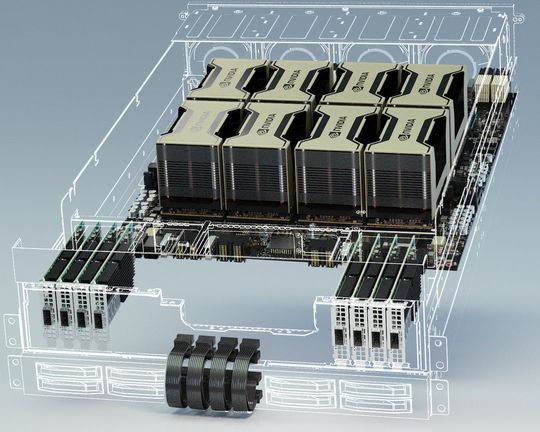Low end of Nvidia’s first-quarter sales estimate is $630 million higher that Wall Street forecast, suggests quarterly revenue could top $8 billion for the first time
Nvidia Corp. provided a strong forecast despite supply constraints Wednesday, after doubling profits and producing record sales in the holiday quarter.
After earnings reached $3 billion and quarterly revenue surged past $7.5 billion for the first time over the holidays, Nvidia NVDA, +0.06% executives suggested sales could top $8 billion for the first time in the current quarter. Driven “primarily” by data-center sales, they forecast revenue in the fiscal first quarter of $7.94 billion to $8.26 billion, well above the $7.31 billion estimated on average by analysts surveyed by FactSet
On the call with analysts, Colette Kress, Nvidia’s chief financial officer, said “there is expected to be accelerated growth as we move into Q1.”
“For Q1, our guidance can include an acceleration of data center from where we left in terms of Q4,” Kress said on the call. “We will have growth across several of our market performs within Q1, both data center, gaming and probably a couple others.”
Shares slipped 2.6% after hours, following a less than 0.1% advance in the regular session to close at $265.11. Shares closed at a split-adjusted all-time high of $333.76 on Nov. 29. All share and per-share figures are presented as split-adjusted.
Back in mid-November, the Santa Clara, Calif.-based chip maker reported quarterly records across the board, much to Wall Street’s celebration, and had forecast that fourth-quarter data-center sales would grow faster sequentially than gaming sales. A year and a half ago, sales of data-center chips surpassed gaming sales for the first time, but that soon switched back.
In the fourth quarter, gaming sales rose 37% to a record $3.42 billion from the year-ago quarter, or a sequential gain of 6%. Meanwhile, analysts surveyed by FactSet had expected Nvidia gaming sales of $3.36 billion.
On the data-center side, sales surged 71% to a record $3.26 billion from the year-ago quarter, or for a sequential quarterly gain of 11%, while analysts expected sales of $3.18 billion. Going forward, however, Nvidia said supply constraints, given the global shortage of chips and silicon-wafer-making capacity, will remain a headwind.
“We still have some supply constraints across a number of businesses,” Nvidia Chief Executive Jensen Huang said on the call. “Networking in the data center on business has been on supply constraint. We’re improving every single day and we do expect to improve supply each quarter as we enter into fiscal year ’23.”
Kress told MarketWatch in an interview that there’s no quick fix to Nvidia’s supply-chain challenge.
“It’s not just one thing,” Kress told MarketWatch. “It’s very important to understand the complexity of the challenge. People say ‘No, tell me what the one thing is.’ If it were just one thing, I swear we would start a team and build it ourselves. It is just not that simple. It is very, very complex.”
Nvidia reported fourth-quarter net income of $3 billion, or $1.18 a share, compared with $1.46 billion, or 58 cents a share, in the year-ago period. Adjusted earnings, which exclude stock-based compensation expenses and other items, were $1.32 a share, compared with 78 cents a share in the year-ago period.
Revenue surged to a record $7.64 billion, up 53% from $5 billion in the year-ago quarter. Analysts surveyed by FactSet had estimated adjusted earnings of $1.23 a share on revenue of $7.42 billion. Nvidia executives guided for revenue between $7.25 billion and $7.55 billion in November.
The earnings report comes a week after Nvidia’s $40 billion bid to acquire chip designer Arm Ltd. officially unraveled, much to Wall Street’s lack of surprise.
“We gave it our best shot,” Huang said on the call. “But, the headwinds were too strong and we could not get regulators the comfort they needed to approve our deal.”
Recently, Nvidia pushed past Facebook parent Meta Platforms Inc. FB, -2.02% for the title of seventh-largest publicly traded U.S. company by market cap.
Over the past 12 months, Nvidia shares were up 73% by Wednesday’s close, while the PHLX Semiconductor Index SOX, +0.03% rose 10% over that period. Meanwhile, the S&P 500 index SPX, +0.09% gained 14%, and the Nasdaq Composite Index COMP, -0.11% was up less than 1%.

